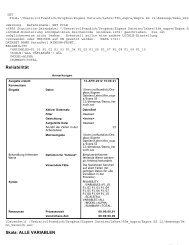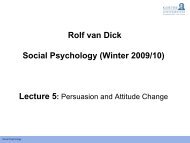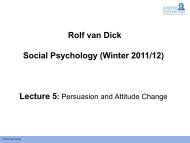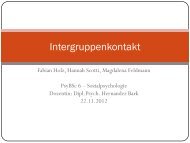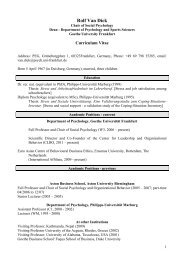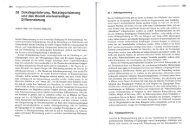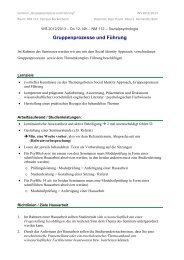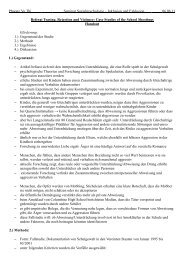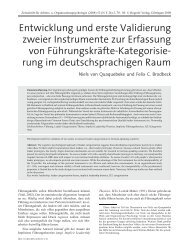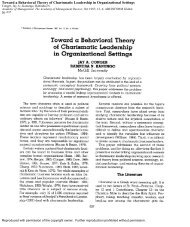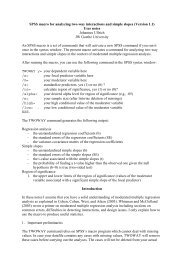Leadership-Interview-Transkript - Sozialpsychologie - Goethe ...
Leadership-Interview-Transkript - Sozialpsychologie - Goethe ...
Leadership-Interview-Transkript - Sozialpsychologie - Goethe ...
Sie wollen auch ein ePaper? Erhöhen Sie die Reichweite Ihrer Titel.
YUMPU macht aus Druck-PDFs automatisch weboptimierte ePaper, die Google liebt.
grow up, get taught not to connect personally, always be objective and never be subjective –<br />
well, I am subjective all the time, I am personal all the time, I am very, very close to the<br />
people all the time, and I think that makes a big difference.<br />
Rolf van Dick: And, do you think that influenced by your American heritage or background,<br />
are you a different leader from other people you know because of your American background,<br />
compared to other German leaders?<br />
Patrick Cowden: Yes, I think, Rolf, there is an element of that. I think I am the way I am<br />
because of where I come from. So I have the combination of the Germanic - and sometimes I<br />
stress the ‘manic’ part of ‘Germanic’ – the Germanic piece and the American piece, as I grew<br />
up. And I believe the values of those two cultures are in all cultures. It is the same everywhere<br />
in the world that we go, but I learned a certain combination. I learned how to keep my<br />
‘Deutsche Tugenden’ of being focused on detail, structured, you know, I need ‘Ordnung’, if I<br />
do not get ‘Ordnung’ I feel uncomfortable, right. You know, process orientation, you know<br />
those types of Germanic traits of me, but on the other side I have got the American pieces, the<br />
‘Begeisterungsfähigkeit’, really be able to be excited and engaged about something that we<br />
would want to do. I have the pieces in regards to creativity, allowing mistakes to be made, so<br />
that we can have more space and room for innovation. I have some of the American pieces<br />
around the charisma and the way to communicate with people that I have been able to<br />
combine. And I think the magic is, when you start to combine the best of the different worlds,<br />
the combination is what makes it better, and each of us have that potential – whether we are<br />
from Germany or from America or from Japan or from Vietnam, my wife is from Vietnam.<br />
We all have the same opportunity to combine pieces of the different cultures that we have<br />
met. And that combination is part of what makes great leadership.<br />
Rolf van Dick: Who has inspired you to become the person you are now? Do you have a role<br />
model or did you encounter teachers or leaders who practiced what you now preach?<br />
Patrick Cowden: Oh, absolutely. My first inspiration in my life was always my father. My<br />
father was a drill sergeant, and a sergeant major in the U.S. Army. So it was always ‘Yes,<br />
Sir’, ‘No, Sir’, everything you say, ‘Sir’. So I grew up with that environment, and he trained<br />
the next generation of leaders in the military. That was one of his roles for about 10 years of<br />
his career, of the 30 years he was in the military. That was all about honor, and integrity, and<br />
process, and quality, and comradeship, and teamwork, you know all these military aspects<br />
that I grew up with, are also elements in business environments later in life. So my father was<br />
an inspiration for me. As I grew up later, I ran into leaders in business, or I read about leaders.<br />
One of my greatest inspirations is Douglas McGregor, who wrote a great book, 1960, ‘The<br />
human side of enterprise’, of the ‘X-factor’ and the ‘Y-factor’. That influenced me later in<br />
life, after I have been leading a business, to understand some of the differences more<br />
consciously, about how people are motivated, and how we should go about great leadership.<br />
But you know, what he did, what Douglas did in the 50’s and 60’s, is something that Daniel<br />
Goleman does now, in Stanford, on emotional intelligence. On the physiological aspect, not<br />
the psychological aspect as Douglas did. And I think those combinations today are becoming<br />
the newest school of thought on leadership. It is no longer just psychology, or just physiology,<br />
or just economics, it is exactly what you guys are doing here in Frankfurt! It is combining all<br />
the different schools of thought into a cross-functional, cross-departmental view of what the<br />
best combination is. And I am probably a human experiment, of what is the best combination,<br />
because I grew up in those different cultures and I worked at ten different companies from<br />
four different cultures, in the last 30 years. And I think that combination will be the answer to




